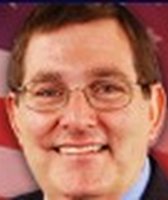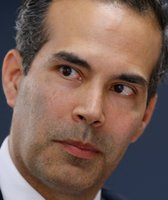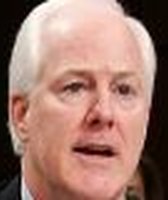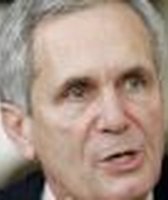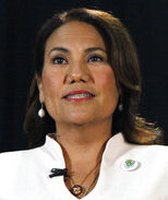Stand up for the facts!
Our only agenda is to publish the truth so you can be an informed participant in democracy.
We need your help.
I would like to contribute
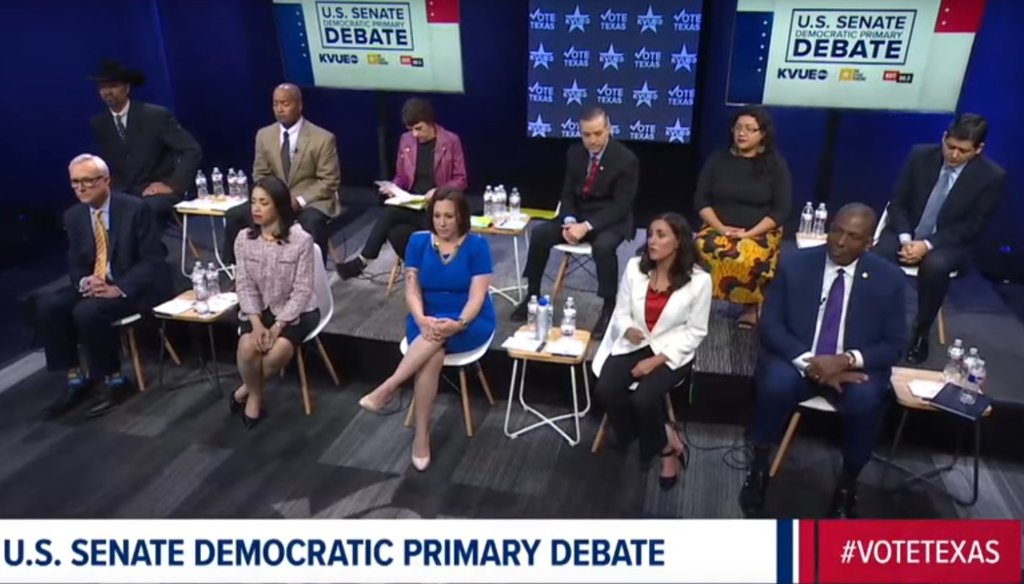
All but one candidate running for the Democratic nomination in Texas’ U.S. Senate race participated in a debate on Tuesday, hosted by KVUE. We fact-checked them.
As Texas voters took to the polls on Tuesday, the first day of early voting in the state’s March 3 primary, all but one of the Democratic candidates running for the U.S. Senate participated in their second debate of the race.
The debate featured 11 candidates, each hoping to be the one voters choose to challenge Republican Sen. John Cornyn in the general election: Chris Bell, Michael Cooper, Amanda Edwards, Jack Daniel Foster Jr., Annie "Mamá" Garcia, Victor Hugo Harris, MJ Hegar, Sema Hernandez, Adrian Ocegueda, Cristina Tzinztún Ramirez and Royce West.
The 90-minute debate featured questions targeted to each candidate, with an emphasis on those with the highest recent polling numbers: Hegar, Tzinztún Ramirez, Bell, Edwards and West. Even these candidates, however, are widely unknown — a recent University of Texas/Texas Tribune Poll found that most voters hadn’t heard of any of the candidates in the race.
Responses during Tuesday’s debate were limited to 45 or 30 seconds, but candidates still found time to make claims to check.
Here are a few statements from the debate, in context:
Royce West: "When you began to think about our federal prison system, some 2.3 million people incarcerated at a cost of about $31,000 per year…"
When moderators asked each candidate to identify an action President Donald Trump has taken that they support, West, a state senator from Dallas, pointed to the Republican’s actions on criminal justice reform.
"When you began to think about our federal prison system — some 2.3 million people incarcerated at a cost of about $31,000 per year —the First Step Act was an act that was a step in the right direction, but there’s still more to do."
West’s statement needs clarification.
The latest federal figures on "correctional populations in the United States" are available in a 2018 report from the U.S. Bureau of Justice Statistics examining 2016 figures. In 2016, the incarcerated population in the United States was more than 2.16 million
But not all of those individuals are in the federal prison system, as West said. The same report shows that, at the end of 2016, there were 188,300 people in federal prisons, 1,228,800 in state prisons and 740,700 in local jails.
In terms of cost, a 2015 estimate on prison spending from the Vera Institute of Justice found that, on average, the annual cost per inmate in the United States was $33,274, for a grand total of more than $42.8 billion annually.
In Texas, the average annual cost per inmate was estimated at $22,012 in 2015.
Jack Daniel Foster Jr.: "Ten to 15 counties in the state of Texas are urban; the rest are rural."
Foster, who teaches GED classes to state prison inmates in Dayton, said his Democratic opponents are too focused on representing issues of interest to urban voters and don’t focus enough on the needs of voters in rural communities.
"Ten to 15 counties in the state of Texas are urban; the rest are rural," he said. "Most of our candidates are out of touch with rural counties."
Of the state’s 254 counties, 34 counties are members of the Texas Conference of Urban Counties. Counties are eligible to join the conference if they have a population of 100,000 people or more or are part of an urban cluster with neighboring counties.
The 34 counties in the organization contain 79% of the state’s population, according to the group.
The Texas Department of State Health Services uses "non-metropolitan and metropolitan" classifications from the U.S. Office of Budget and Management interchangeably with "rural and urban," and says Texas has 82 urban counties and 172 rural counties.
Chris Bell: "When you mention failed campaigns, I’m really in pretty good company there: Abraham Lincoln, Ronald Reagan, Bernie Sanders, Sheila Jackson Lee…"
Moderators asked Bell: "You’re running on your experience, but that experience only includes two years in Congress and a series of failed campaigns. If voters are looking for experience, why should they select you over someone like state Sen. Royce West?"
Before entering the Senate race, Bell ran for elected office numerous times at the city, state and federal level.
Bell served on the Houston City Council from 1997 but lost a bid to be mayor of Houston in 2001. The following year, he was elected to the U.S. House, where he served one term. He was defeated in his re-election bid by Rep. Al Green.
In 2006, he was the Democratic nominee in the Texas governor’s race and lost the general election to Republican Rick Perry. In 2015, he ran for Houston mayor again but was unsuccessful.
What about the politicians Bell named? Did they lose races during their political careers?
Abraham Lincoln: Before being elected president in 1860, Lincoln ran for a seat in the Illinois state legislature, Congress and the U.S. Senate, according to an account of his election history from Snopes. He lost his campaign for a seat in the statehouse in 1832 and then won election there two years later.
While serving in the legislature, he ran two unsuccessful campaigns to be speaker of the Illinois House of Representatives. Lincoln served one term as a congressman from Illinois, following the Whig Party practice of the time of not seeking re-election.
Lincoln also expressed interest in serving in the U.S. Senate, which at the time were positions appointed by the Illinois state legislature.
Lincoln withdrew from consideration for a Senate seat in 1854 after the process was deadlocked and he didn’t receive a majority of votes. In 1858, when he was again interested in a Senate seat, his party did not gain control of the state legislature and he was not appointed.
Ronald Reagan: Reagan served as governor in California before he was elected president in 1980, but his winning campaign wasn’t his first bid for the White House.
Reagan first sought his party’s nomination for the presidency in 1968, but Richard Nixon secured the nomination. In 1976, Reagan lost the nomination to Gerald Ford.
Bernie Sanders: PolitiFact looked at the election history of Democratic presidential nominees in January, including Vermont’s senator. Sanders has lost seven elections during his political career, including campaigns for governor of Vermont and seats in Congress.
Sheila Jackson Lee: The U.S. representative has represented Texas’ 18th Congressional District since the 1995 election, which came after years of service at the city level and some unsuccessful election bids.
On her campaign website, Jackson Lee’s biography glosses over these early losses: "In 1983, Jackson Lee chose to pursue elected office to become Harris County judge. After several close races, she was appointed to the City of Houston Municipal Court to serve as judge in 1987."
Annie "Mamá" Garcia: "In this country, we are such an outlier compared to any other country in the world. We have more people that die at the end of a barrel every week than most countries experience in an entire year."
PolitiFact has examined a number of similar claims.
As a presidential candidate, Democrat Beto O’Rourke said that "no other country comes even close to" the number of people who die due to gun violence in the United states. We rated that Claim Mostly False.
Studies show that the United States experiences more firearm injury deaths than other countries, but only countries of similar socioeconomic standing. Garcia’s claim, like O’Rourke’s remark, was about "any other country in the world."
A study of worldwide firearm deaths in 2016 shows that Brazil experienced more firearm injury deaths, and a separate analysis of the study found that more than a dozen countries had more firearm deaths per capita than the United States.
Cristina Tzinztún Ramirez: "When LBJ was our president, the highest income bracket in this country paid 70%. Today it is just 37%."
Tzinztún Ramirez’s statement about the current tax rate for the highest income bracket, based on 2019 figures. The 37% rate is for people with taxable income higher than $510,300 for single filers and $612,350 for married couples.
What about under President Lyndon B. Johnson?
When Johnson took office in 1963, the tax rate for the highest income bracket was at 91% for people with taxable income higher than $300,000, or $400,000 for married couples, according to historical figures from the Tax Foundation.
In 1964, the rate was 77%. Then the rate for the highest income bracket fell to 70%, where it stayed for the remainder of Johnson’s presidency.
The rate stayed at 70% until 1982, when it dropped to 50% for the highest income bracket. It fell to 38.5% in 1987 and has fluctuated in the intervening years.
Our Sources
Texas Tribune, MJ Hegar leads the Democratic U.S. Senate candidates, UT/TT Poll finds, Feb. 17, 2020
U.S. Department of Justice, Correctional Populations in the United States, 2016, April 2018
Vera Institute of Justice, Prison spending in 2015, accessed Feb. 18, 2020
Texas Conference of Urban Counties, accessed Feb. 18, 2020
Texas Department of State Health Services, Definitions of County Designations, accessed Feb. 18, 2020
Snopes, Abraham Lincoln and Failure, July 12, 2000
PolitiFact, The Democratic debates’ biggest (electoral) losers by the numbers, Jan. 14, 2020
PolitiFact, Are there more gun deaths in the United States than any other country?, Aug. 2, 2019
Tax Foundation, 2019 Tax Brackets, accessed Feb. 19, 2020
Tax Foundation, Federal Individual Income Tax Rates History, accessed Feb. 19, 2020


